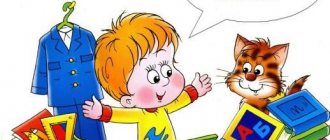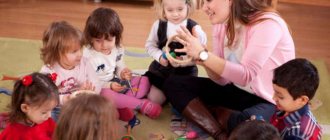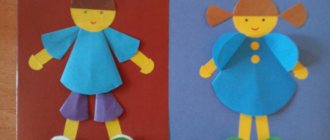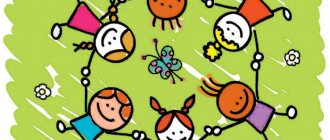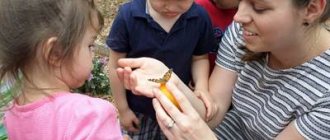The time comes when every parent teaches their child to eat, drink, dress, and brush their teeth independently. It would seem that such simple and ordinary things that every child sooner or later learns to do. But independence is not only about ordinary physical skills. In order to cultivate independence in a child, it is also necessary to pay special attention to the development of strong-willed independence. So that the baby can make the right decisions in his life and not be afraid to make a mistake.
The task of parents is to teach their little one to make informed choices. A child should be taught to be independent from an early age, because it is during this period that a person’s personality is formed. In this article we will talk about how to teach a child independence, what parenting styles are, and what mistakes parents make.
What is independence
In order to begin raising an independent child, you need to understand what independence is.
Independence is a human property that manifests itself in initiative, adequate self-esteem, criticality and the ability to be responsible for one’s actions and deeds. An independent person is able to set goals for himself, achieve them, can solve his problems, and exist independently of others.
Independence is not only physical skills and abilities, independence is a way of life, the ability to make the right choice, solve problems, be responsible for one’s actions, and not depend on the opinions of other people.
Fostering independence in children should be based on four main criteria:
- It is necessary to form adequate self-esteem in the child
- Develop initiative in your baby
- Develop critical thinking, especially in teenagers
- Foster a sense of responsibility
Many parents believe that children become independent closer to 10-15 years of age. In fact, this is a false assumption. At this age, it is already difficult to instill independence in your child; it will be difficult for him to do something without outside help and be responsible for his actions.
When does a child become independent? With proper upbringing, even at the age of three, a child is able to be independent: he can take care of himself, is aware of his obligations, and has simple self-care skills. Such children develop better qualities such as determination and self-confidence.
Why is this necessary?
The concept of independence includes not only self-care skills. There is such an education in it as arbitrariness. Due to it, a person controls his behavior. The child’s success at school depends on this.
With good development of the level of arbitrariness, it is easy for a student to sit in class, concentrate on the task, and absorb the material. This quality has a positive effect on the formation of adaptation to society. The reaction of the social group depends on how correctly and quickly the child adopts the norms of behavior.
Voluntariness serves as the basis for the following skills:
- Ability to obey rules.
- Orientation in the system of requirements.
- Hear and listen to others, follow verbal instructions.
- The ability to perform an action based on a visual model.
In preschool age, a child is more prone to impulsiveness and situational behavior. Therefore, you should not expect instant changes from him. From the age of four, you need to help him develop control over his actions.
Why are children not independent? How it begins
Definitely, every parent wants only the best for their children, takes care of them, tries to protect the child from any failures, some give them excessive custody in almost everything. Such parents are afraid that, having shown independence, the child may make a mistake. Of course, it’s much faster to feed your child while he’s still struggling to bring the spoon with porridge to his mouth, to dress him, to put away his toys for him. But in this way the parents suppress any of his initiatives. As a result, some children grow up to be lacking initiative and helpless people.
Another option is parents who are too strict. In this case, the baby is simply afraid to do something on his own, in case he fails or does it wrong, which could upset his mom or dad. There is only one way out for him - not to show initiative, so as not to bear any responsibility for his actions.
The best time to develop independence in preschool children begins at the age of 2-3 years. It is during this period that children begin to become the most proactive. Watching those around them, they want to perform some actions themselves. The so-called “I myself” period begins.
At this age, the baby begins to realize that he is an individual, separate from mom and dad, tests his independence, what he is capable of, while observing the reaction of adults.
It is very important to allow your baby to be independent; you don’t need to do everything for him. But this does not mean that the little man needs to be allowed everything. This approach can harm or injure the child. It is important for parents to be there, support the baby, help and explain.
Give your child a choice
What should parents do if they want to develop their child’s independence? Your baby should be able to make independent choices in everyday situations :
- what toy he wants to play with;
- orange or apple for breakfast;
- will draw with pencils or paints;
- what he wants to draw;
- walk with dad in the yard or go with mom to visit her friend.
And, of course, you can’t completely suppress a child’s initiatives. Adults just need to be sure to control the boundaries of children’s behavior. This is necessary in order to guarantee the safety of the child’s activities. Children do not have the skill to anticipate danger. It also needs to be shaped, just like the development of independence.
Parenting styles
50 years ago, psychologist Diana Baumrind expressed the opinion that family upbringing is built on such basic qualities as responsiveness and demandingness. Thanks to various combinations of these qualities, different types of education appear. Despite this, just one of them allows you to instill in a child an adequate sense of responsibility, without causing harm to his personality.
Authoritarian style
Parents who raise their children this way are very demanding of their child. They pay special attention to rules and control. They understand perfectly well what is right and wrong, what can be allowed and prohibited, what is harmful and what is useful. Parents are convinced that only strict rules can protect their children from various failures. If a child does something not according to the rules, he must be punished, otherwise he will “get on his neck.”
This type of education combines high demands and low responsiveness. Experts in the field of psychology claim that such children grow up to be hardworking people, but lacking self-confidence, lack of initiative, and with rather low self-esteem. Children of authoritarian parents are not able to make a decision; they rely on the opinion of a more authoritative person.
Indulgent style
Parents who raise their children according to an indulgent style always listen to the wishes of the child and go along with it. They believe that various prohibitions or punishments are no longer relevant and such methods of education are outdated.
Most often, such parents themselves did not receive enough care from their relatives in childhood. And in this way they try to make up for the lack of parental affection. For example, adults may remember that their father or mother was quite cold towards their child, and they think: “I will raise my baby differently.” Indulging parents want to show their baby that they are not only mom and dad, but also his friends.
This style prioritizes high responsiveness. The requirements here are minimal. An indulgent parenting style is not correct, since parents who refuse to punish their child for their misdeeds risk raising a selfish, narcissistic person who will believe that everyone is owed to him, and his wishes should be fulfilled right now.
Democratic style
The most acceptable type of education is democratic. Here, exactingness and responsiveness are evenly combined. Democratic parents know how to hear their child and take his opinion into account. At the same time, they can apply punishment for certain behavior and actions (for example, when a child offends another or behaves incorrectly). Such parents can always explain to the child what exactly upset them and why the punishment or ban followed. Relationships are always built on conversation.
Democratic parents differ from authoritarian ones in that the former always give the child some freedom within reason. For example, parents raising children in a democratic style will tell their child: “You can watch cartoons, but first put away your toys.” Such children learn to correctly perceive boundaries and take responsibility for their actions.
In reality, parents' parenting styles may differ. For example, dad is strict, but mom is quite gentle with her baby. It is important for parents to come to one specific type of parenting. Only in this case will the little one begin to realize what can be done and what cannot. Do not forget that the baby should know that he is heard and his opinion is also important.
How not to foster independence in a child
Teaching a child to be independent is actually not as difficult as it seems. Often mothers and fathers, wanting to help their baby, interfere with the adequate development of his personality. Of course, when a baby is one or two years old, he is not yet able to fully care for himself, and parents will continue to care for and support their child for many years to come. But this does not mean that parents should always make decisions for him and do any work.
Typical mistakes parents make in raising an independent child
- Commanding tone . In this case, the baby’s room will always be clean, but not because he himself wants it, but because he is simply afraid to go against the will of his parents. In this case, adults do not give the right to choose and do not take into account the child’s opinion.
- Substitution of concepts. Here the parents do their best to protect the child: “don’t you want to clean up your toys? It’s okay, you’re probably just a little tired.” Substitution of concepts prevents the formation of a sense of awareness. And without this it is impossible to cultivate independence.
- Compassionate help. Does your child not take up his homework until the last minute? Moms or dads want to help their child because he is still so small and wants to play. In this case, the child will not learn to be responsible.
- Ridicule. Basically, a young child is not yet able to fulfill any requests from adults as well as the parents themselves. He has not yet gained enough experience or dexterity. Under no circumstances should you mock or joke, even in a kind way, about the results of his activities. Otherwise, the baby may lose faith in himself and will no longer want to take the initiative.
A few words about the concept of “independence”
Independence is often understood as a specific property of an individual that helps to realize oneself as a person. Currently, teachers and psychologists pay a lot of attention to the development of children's independence during the period of preparing preschool children for the start of school. This is the most important period in the development of a child’s personality.
If a child is independent, he takes initiative and takes a responsible approach to any activity. Independent children exhibit some independence. Whether it's a gaming or educational activity.
How to raise an independent child
When developing independence in young children, parents need to be patient. After all, sometimes it’s easier to pick up and feed the baby, put away toys for him, etc., thereby hindering his own initiative. It depends only on the parents how independent, independent and responsible the little one will grow up to be.
Basic recommendations on how to help your child become independent:
- Allow your child to make his own choices . You don’t need to decide everything for your child, give him a choice: “Shall we go for a walk to the park or playground today?”, “What will you have for breakfast: an omelet or a casserole?”, “Which blouse will we wear: green or blue?” Thus, the baby learns to think and make decisions.
- Ask your child for help, trust him with simple chores around the house. For example, helping to sort out a bag of groceries or throwing out unnecessary trash while cleaning. Always praise your child, even if you are not entirely satisfied with the result. The baby will know that his mother appreciates his help, and he will want to help again.
- Let your child explore and gain experience. A child can take apart a new toy not because he wants to break it, he is interested in how it works. Try to get rid of words such as “don’t touch!”, “don’t run!”, “don’t jump!”
- Assign an older child to carry out daily chores , instill a hard work ethic, for example, watering flowers or changing the water for a cat or dog. At first he will need to be monitored and reminded. Don’t forget to encourage your baby, and when guests come, tell him what a responsible and independent child you have and that thanks to him, such beautiful flowers grow on your windowsill.
- There is no need to do for your child what he already knows how to do. If your child can already hold a spoon and bring it to his mouth, allow him to feed himself.
- Teach your child, show by your own example. First, show how to make your bed, then do it together, and then let your baby do it on his own.
- Allow your child to make mistakes. After breakfast, invite your little one to wash his plate. And it doesn’t matter how well he does it. Do not criticize, on the contrary, praise him, and while the baby is captivated by the game, wash him properly.
- Think about each of your prohibitions. Of course, there are necessary prohibitions for the safety of the baby (crossing the road in the wrong place, overeating on sweets), but sometimes parents say the word “no” for their own convenience. After all, it’s easier to forbid your child to touch the mop than to show him how to properly wash the floor.
- Help when the child asks. Teach your child to ask you for help when he is unable to do something on his own. But it shouldn’t look like your child doesn’t want to put away the toys because he’s tired, and you immediately start cleaning. No, parents' help is not needed here at all. A child needs help if he really cannot cope with some task on his own.
- Create conditions for independent activities or games. For example, engage in creativity. If a child is already old enough, he does not have to sculpt, draw, or make appliques under the supervision of an adult. And don’t forget about freedom of choice, let the child decide for himself whether he wants to sculpt or draw today. Teach your child to find activities for himself.
- Ask your child for advice or opinion. When the baby was still very small, his parents decided everything for him. If you continue to adhere to this behavior, the child gets used to the fact that any problem can be solved for him. And if you consult with your child, he feels important.
- Believe in your child . If you support your child and believe in his strength, then later this will give great success in fostering independence. Praise him, tell him. that everything will work out for him, ask. does he need your help?
- Try to avoid overprotection. There is no need to constantly lead the child by the hand, prohibit him from riding a bicycle quickly, and so on. Thus, you suppress his initiative and the baby may develop not entirely adequate self-esteem.
- Set the right example. After all, kids always copy the behavior of their loved ones. If you never wash dishes after eating, then your child will most likely never do the same.
To summarize, we can say that the most important thing for raising an independent child is simply not to interfere with him and not to do for him what he himself can do, but only to show and guide. There is no need to look for excuses about lack of time (it’s easier to feed or dress the baby), or that the baby is still very small. Thus, parents gradually each time more and more hinder the development of independence and initiative of the baby.
Now there are a lot of useful books and lessons on the topic “how to teach a child to be independent.” We recommend that you take Elena Danilova’s online intensive course on developing independence and responsibility “Myself.” The author gives a lot of interesting information about nurturing independence in children from 1 to 12 years of age.
INTRODUCTION
The relevance of research. The problem of developing independence in children has been and remains one of the most pressing in pedagogy. The volitional qualities of a person are the core side of a person’s character, and serious attention should be paid to their upbringing. A very important volitional quality necessary for a child’s future activities is independence.
Interest in the problem we are studying is currently determined by the humanistic tasks of a more complete disclosure of the individuality of the developing personality. Life in all its manifestations is becoming more diverse and complex; what is required from a person is not stereotyped, habitual actions, but a creative approach to solving large and small problems, the ability to independently pose and solve new problems. The younger the children, the weaker their ability to act independently. They are unable to control themselves, so they imitate others.
The expediency of forming at the stage of preschool childhood an individual who does not passively contemplate reality, but actively transforms it, is outlined in a number of studies and regulatory legal documents. Thus, in the “Concept of Preschool Education” it is noted that it is necessary to “encourage children to take initiative and independence”; it defines the main provisions for the formation of not just a social individual, but a socially active personality.
The problem of independence is currently being studied in various aspects. The following are explored: the essence of preschooler independence, its nature; structure and correlation of components of independence; stages, conditions and methods of developing the independence of a preschooler; the relationship between independence and various mental processes.
All of the above determines the relevance of the work and allows us to formulate a hypothesis, purpose and objectives of the study.
Purpose of the study: to study the level of formation of independence in children of senior preschool age.
Object of study: the process of developing independence in older preschoolers.
Subject of research: children of senior preschool age.
Based on the goal, the following research tasks were set:
.Reveal the theoretical foundations for the formation of independence in preschool children.
. To determine the conditions for the formation of independence in preschool children. Select methods and techniques for conducting empirical research.
. To conduct a study of the level of independence development in children of senior preschool age.
Research hypothesis: the formation of independence in children of senior preschool age will be carried out most successfully if:
parental attitudes towards the formation of independence in children of senior preschool age have been established;
- the criteria and levels of formation of independence of older preschoolers have been determined, taking into account its specifics;
The base of the study is children and their parents of the Milyashkay MBDOU in the village of Muslyumovo, Muslyumovo district.
Research methods:
Methodology of “Diagnostics of Parental Attitudes”, A.Ya. Varga, V.V. Stolin;
“Story Pictures” technique, E.O. Smirnova, R.R. Kalinina;
“The fourth odd one” technique;
“Construction” technique, S. Zabramnoy;
“Sculpture” technique;
“Multi-colored balls” technique.
CHAPTER 1. Theoretical foundations for the formation of independence in preschool children
preschooler independence education
1.1 The concept of independence in psychological and pedagogical research
Children's independence has recently increasingly become the object of increased attention by scientists, teachers and educators. This is connected not so much with the implementation of a person-oriented and activity-based approach to the development, upbringing and education of children, but with the need to solve the problem of preparing the younger generation for living conditions in modern society, a practice-oriented approach to organizing the educational process. Within the framework of this approach, it is believed that children in the process of education and training in kindergarten must learn to independently set the goals and objectives of their activities, analyze its conditions, formulate problems and hypotheses, assumptions about options for solving problem situations, find means for this, and overcome disagreements , organize and adjust the course of both individual and joint activities, achieving a positive result.
Independence - independence, freedom from external influences, coercion, from outside support and assistance. Independence - the ability to act independently, make judgments, have initiative, and determination. Such definitions are given by the Explanatory Dictionary of the Russian Language. In pedagogy, this is one of the volitional spheres of the individual. This is the ability not to be influenced by various factors, to act on the basis of one’s views and motives.
Interest in this problem is due, first of all, to the fact that the desire for independence is characteristic of young children. This is an internal need of the child’s growing body that needs to be supported and developed.
Any activity is independent only when the person performing it masters it in full, i.e. becomes its carrier. In this regard, independence can be defined as a special moment in the formation of an integral activity, as a criterion for the degree of mastery of this activity.
The authors note that independence is one of the leading qualities of a person, expressed in the ability to set a specific goal, persistently achieve its fulfillment on one’s own, take a responsible attitude towards one’s activities, and act consciously and proactively not only in a familiar environment, but also in new conditions, requiring non-standard decisions.
According to specialist teachers and psychologists, independence is a mental state of an individual, which includes: the ability to set a task for oneself; the ability to retain in memory the ultimate goal of an action and organize one’s actions in line with its achievement; the ability to perform actions to varying degrees of complexity without outside help, and to correlate the result obtained with the original intention.
Numerous studies by teachers and psychologists devoted to the problem of independence of preschool children
in their play and work activities, in everyday behavior,
allow us to clarify some signs of a child’s independence.
1. A child’s independence has nothing to do with his spontaneous behavior. Behind the independence of a child (of any age) there is always the leadership role and demands of an adult.
2. The level of independence of children increases with their development, with their increasing ability to perform increasingly complex physical and mental actions.
. Three stages can be outlined in the development of independence.
The first stage is when the child acts in his usual conditions, in which basic habits were developed, without reminders, encouragement and help from an adult (he himself removes building material after playing; he himself goes to wash his hands when he is called to the table; he himself says “please” ” and “thank you” when asking for something or thanking for help).
The second stage - the child independently uses familiar methods of action in new, unusual, but close and homogeneous situations. For example, having learned to clean her room, Natasha, without prompting from adults, swept her grandmother’s room herself and put the dishes in an unfamiliar closet. Without her mother’s request, Ira herself brought a chair from the room into the kitchen and invited the neighbor, who came to see her mother, to sit down. In kindergarten she was taught to offer a chair to guests.
At the third stage, a further transfer is possible. The mastered rule acquires a generalized character and becomes a criterion for the child to determine his behavior in any conditions.
Thus, independence is always a product of submission to the demands of adults and at the same time the child’s own initiative. And the better, deeper, and more meaningfully a child has mastered the rules of behavior, the greater his ability to proactively and independently apply them in new, diverse living conditions.
The competency-based approach is becoming the leading direction in the modernization of the domestic education system. It is worked out most deeply in the basic development program for preschool children “Origins”. Competence in the program is defined as the most important comprehensive characteristic of an individual, which includes a number of aspects: intellectual, linguistic, social and others, which reflect the achievements of the child’s personal development. Important indicators of a child’s social competence are voluntariness—the ability to control one’s behavior in accordance with ideas, rules, and norms; the ability to build cooperative relationships in the process of training and education; competence in the field of social and labor activities; self-organization skills, ability to work in a team. Part of social competence is the child’s competence in the everyday sphere.
Analyzing the acquired skills and formed qualities that correspond to key competencies (general cultural, physical, cognitive, value-semantic, communicative, personal competencies (Appendix 1)), we can easily identify independence as one of the qualities of a socially competent person or as the basis for the formation of other significant social qualities , such as, for example, subjective activity, creative initiative, self-knowledge, self-perception, self-change, self-development. By and large, a child’s independence is the basis for the formation of all key competencies. The child’s failure to demonstrate independent active activity leads to the impossibility of him acquiring general cultural, cognitive, and personal competencies, i.e., it leads to social immaturity. It is through active activity and independent trial and error that a child gains experience in various areas of life, including social.
The development of independence in preschool age is associated with the child’s mastery of various types of activities (play, work), in which he acquires the opportunity to demonstrate his subjective position.
The independence of children unfolds from independence of a reproductive nature to independence with elements of creativity, with a steady increase in the role of children's consciousness, self-control and self-esteem in the implementation of activities.
Each activity has a unique impact on the development of different components of independence.
. Thus, the game promotes the development of activity and initiative.
Different approaches to children's play are reflected in many works. Among these approaches, one can highlight the explanation of the nature of the essence of children's play, as a form of communication (M. I. Lisina), or as a form of activity, including the assimilation of adult activities (D. B. Elkonin), or as a manifestation and condition of mental development (Piaget AND.).
Each of these approaches, while highlighting some aspect of the game, ultimately turns out to be insufficient to explain the essence and specifics of children's play as a whole.
Despite the fact that gaming activity is leading in preschool age, its importance does not decrease subsequently. L.S. Vygotsky noted that in preschool age, play and activities, play and work, form two main channels along which the activities of preschoolers flow. Vygotsky L.S. I saw in play an inexhaustible source of personal development, a sphere that defines the “zone of proximal development.”
Hence, the essence of the problem lies in the influence of the game on the development of children’s independence, creative abilities, and personal qualities. The game creates a positive emotional background, against which all mental processes occur most actively. The use of gaming techniques and methods, their sequence and interrelation will help in solving this problem.
The relevance of the problem under study is caused by the need of psychologists, teachers, and parents for improved methods of psychological and pedagogical influence on the developing personality of the child in order to develop the independence of children.
Perhaps the game attracts the child with its incomprehensible variety of situations that require him to actively demonstrate individuality, intelligence, resourcefulness, creativity and independence
. Work activity provides favorable opportunities for developing purposefulness and awareness of actions, and perseverance in achieving results. Already a young child has a desire to independently perform actions with objects related to the world of adults (wash dishes, set the table, vacuum, etc.). This desire can be in demand and developed in various types of household work. Formation of household skills
labor is necessary, first of all, for the development of independence.
In older preschool age, the child’s attitude towards his responsibilities changes and responsibility for his work appears. A new motive appears - “to do for others”, the child shows initiative, his attitude towards himself changes, and objective self-esteem appears.
By performing basic work skills, children begin to work together, distribute responsibilities among themselves, negotiate with each other, carry out their actions so that the other can successfully continue them.
Older preschoolers help each other, control, correct each other, show initiative and independence, have a correct attitude towards evaluating their work, rarely praise themselves, and often show modesty when evaluating their work (Elkonin D.B.).
Elementary forms of household labor are interesting and important because a unique relationship is established between a child and an adult: these are relationships of real mutual assistance, coordination of actions, and distribution of responsibilities. All these relationships, arising in preschool age, continue to develop in the future.
. Productive activities develop the child’s independence from adults and the desire to find adequate means of self-expression.
. Communication. At preschool age, in addition to communication with adults, communication with peers is differentiated and reaches an expanded form, the basis of which is a relationship of mutual respect, possible only between equals. By the age of five to seven
the peer acquires individuality in the eyes of the child. An older preschooler shows a keen interest in his friends, which manifests itself in the form of active imitation and a desire for competition.
According to M.I. Lisina, a child’s communication with peers leads to the emergence of an image of another person and, in parallel, an image of himself.
. Self-organization is an activity aimed at searching and creatively transforming reality, high adaptability, active mobilization of the individual’s internal resources. In psychology, human activity is considered as internal (mental) and external (motor) activity, regulated by a conscious goal.
Based on the above, independence is presented as the initial basis. The launching pad for the formation of self-organization as a whole, which is closely related to the subjective activity of the individual.
One of the common factors of positive communication between children is considered to be the subjective activity of the individual, presented in the form of independence—a quality that is undoubtedly necessary for the development of the child’s personality. Independence, acting as a personal factor, can determine the positive relationships of children in the family.
Hard work and independence, a developed ability for self-regulation create favorable opportunities for the development of preschool children outside of direct communication with adults or peers. We are talking, in particular, about the ability of children of this age to spend hours alone doing what they love. At this age, it is important to provide the child with various didactic educational games.
Indicators of independence of an older preschooler are: the desire to solve problems of activity without outside help
other people, the ability to set a goal for an activity, carry out basic planning, implement what was planned and get a result adequate to the goal, as well as the ability to show initiative and creativity in solving emerging problems.
Characteristic features of developed independence:
a) the ability to perform work on one’s own initiative, to notice the need for certain actions (water flowers if the ground is dry;
when you see a mess, clean it up);
b) the ability to perform work without outside help, without the constant supervision of an adult;
c) consciousness of actions, the presence of basic planning (the ability to understand the purpose of the work and foresee its result);
d) the ability to give a fairly adequate assessment of one’s work and exercise basic self-control;
e) the ability to transfer known methods of action to new conditions.
The lag in the development of independence in preschoolers is largely a consequence of improper organization of children’s activities, errors in upbringing: excessive regulation of activities, constant control and guardianship, the predominance of direct methods of directing children’s actions, learning to act by directly imitating an adult’s demonstration, etc. And vice versa, upbringing independence is successful when an adult actively encourages children to take initiative, teaches them to independently plan upcoming work, develops the ability to talk about upcoming work, highlight its goal and result.
Teaching children basic self-control plays an important role in the development of independence. Self-control is mastered by children gradually: from the ability to exercise it based on the achieved result to self-control over the way the activity is carried out and on this basis to self-control over the activity as a whole.
It is necessary to develop the desire for friendly independent activity, cultivate the habit of using morally acceptable methods of interaction, and actively introduce elements of mutual learning and mutual assistance. The use of tasks such as “Teach your friend what you can do yourself,” performing work according to the collective plan of its participants, independent organization of activities according to the task proposed by the teacher - all this contributes to the gradual development of children’s independence in joint activities. The incentive to demonstrate independence is a positive assessment of the teacher, the creation of public opinion, as well as the desire of older preschoolers to become independent, actively supported by the teacher.
Modern research has shown the effectiveness of using special external visual aids in older groups that make it easier for the child to independently complete certain tasks and organize activities correctly.
Temperament, innate abilities, area of interest, family style of reward and punishment - all significantly influence the pace of development of children's independence. Therefore, you should not get carried away by age norms; it is better to compare the child’s independence with that
what happened a week, month or year ago. If his “repertoire” of independent actions grows, it means that he is developing normally, even if he is not fully coping with what his peers are more successful in.
Independence is not given to a person from birth. It develops as children grow older and has its own characteristics at each age stage. And it is important for parents to take this into account, change the methods of raising the child, respect his independence, support his aspirations, encourage and tactfully guide his independent actions. Undoubtedly, independence should be encouraged, moreover, it should be prepared for it.
The first manifestations of independence should be stimulated, because at an early age the child’s self-esteem is not yet sufficiently developed, and it is mainly replaced by the assessments of parents and other adults. Self-esteem begins with self-criticism, i.e. with doubts about the correctness of their actions.
In the process of life, the child’s personality is subject to constant control by adults, the external environment, and the nearest microsociety. Gradually, he develops a self-organizing principle, which, in our opinion, is expressed in independence, activity, and harmonization of relationships between members of the team and the family itself.
Fostering independence is an integral requirement of today's reality, and presupposes the formation of purposefulness, independence, breadth of views, thinking, flexibility of mind and actions, entrepreneurship and a sober analysis of phenomena and situations occurring in life. To avoid mistakes in upbringing, it should be remembered that the qualities that characterize independence are closely related to other aspects of the personality and appear ambiguously in different combinations and conditions. The same trait of independence in combination with some qualities can characterize a person positively, but in combination with others - negatively.
Despite the inconsistency in defining the independence of preschool children, scientists are unanimous on one thing: independence is the most important characteristic of a person; independence cannot arise in isolation from other personal properties (arbitrariness, will, determination); without independence, a person does not become complete.
1.2 Conditions for the formation of independence in preschool children
The effectiveness of the formation of independence in children of senior preschool age will be facilitated by the following pedagogical conditions: targeted formation of independence in the family, taking into account the level of development of this quality in the child; cooperation between preschool educational institutions and families in order to increase the level of independence of children.
Forming independence is a long and complex process, and parents play a major role in it. It depends on them how the child will grow up.
A child’s success in various activities largely depends on the ability to act independently, but it is the development of independence that often worries parents the least. Only after sending their child to kindergarten, they are surprised to discover that their “charming bunny” lags behind his peers, and together with the teacher they begin to take decisive action to correct the current situation.
The nature of the relationship between preschool children and their parents depends on many factors. Let us designate the most significant ones, those that seriously influence the development of a child’s independence in older preschool age.
These include:
·personal characteristics of the parental figure, forms of behavior of parents in the family and outside it;
·personal characteristics of the child;
· pedagogical competence of parents, their level of education;
·quality of emotional connections in parent-child relationships;
means of educational influence used by parents and other adults;
·involvement of the child in the life of the family;
·the degree of satisfaction of the child’s current needs in the family.
The psyche of a developing personality is active, each child will find his own path to independent knowledge of the surrounding reality, the problem is whether a growing person of five to seven years old will choose the social path. It is very important that older preschoolers choose such means of self-affirmation, find such ways of receiving parental attention, love and care that would help them in the experience of socialization and increase confidence in their abilities. Parents should help their children by sincerely accepting the individual manifestations of the growing person's personality.
Therefore, for adequate actions to develop independence in preschool age, parents should know a lot, but perhaps most importantly, knowledge about the stages of development of independence, as well as the rules for its formation.
Up to a certain point, all children’s actions are primitive: they roll a ball, wave a broom, put something in a box. These imitative operations are called actions “in the logic of the subject.” The child does not really think about why he is waving a broom - he simply reproduces a familiar action, not realizing that it has a special meaning: after its completion there should be a certain result - a clean floor. When a child sets his goal to make the apartment clean and for this purpose takes up a broom, then we can consider that he has taken the first step towards independence, acted “in the logic of the goal.” Taking initiative is the first component in developing independence.
If you help a child regularly, the second component of independence will soon be revealed in his actions - purposefulness, manifested in passion for the task, the desire to get not just any result, but the desired result. The child becomes diligent, persistent, and organized. Failure does not become a reason to abandon your plan, but forces you to redouble your efforts and, if necessary, even seek help. It is very important to help the child in time - this is a necessary condition for the development of his independence. The child will refuse help as soon as he feels that he can cope on his own. A child's sense of purpose manifests itself in unbridled initiatives: washing clothes like mom, or hammering nails like dad. But at first there is no skill, no perseverance, and so that the initiative does not disappear, you need to help. And parents, unfortunately, are not always willing to support children’s “attacks” of independence: they are both burdensome and unsafe. But it is also impossible to abruptly stop or often switch the child’s attention to actions that are more reasonable, in the opinion of adults: this will slow down the development of the child’s emerging independence and throw him back to primitive imitation. Only as a last resort, if he has already thought of something out of the ordinary, can he resort to this - otherwise, the initiative must be supported.
Having mastered the second component of independence - the purposeful implementation of his intentions, the child still remains dependent on the adult, or more precisely on his ability to correlate the result with how it should be. The child does not have enough experience to independently determine whether a result that suits everyone has been achieved. The bearer of this knowledge is an adult, so he must evaluate every independently conceived and carried out action of the child, and this is a whole art. With the appearance of the first sprouts of independence, the child becomes very sensitive to his rights to express it; he reacts just as sharply to the assessment of his actions. If you speak rudely, harshly, or indistinctly about his “adult” initiatives, they may disappear forever, along with your hopes for the child’s independence. Therefore, no matter how bizarre his idea may be, first praise it, emotionally support it, and only then tactfully explain why it didn’t work out. By listening to your arguments, over time he will learn all the concepts of “generally accepted.”
At the older preschool age, the child already almost unmistakably understands what he did well and what he did badly, what he should be ashamed of and what he shouldn’t, and without our assessment. This kind of ability—the function of self-control—is the final component in the formation of independence in objective activity. Having mastered the ability to independently plan, implement and control it, the child becomes to some extent independent of the adult. But this is only the first and very modest step on the path to mature independence.
There are several rules for developing independence:
Rule #1. It is impossible to evaluate the independence of people of different ages, different levels of mental and mental development, and different sociocultural layers by the same standards.
Scientists have identified a number of activities that maximally ensure the mental development of children at one or another stage of childhood - mastering them in full allows the child to become independent “according to his age.” So, from 3 to 7 years, the leading activity is play.
Rule #2. Independence is a subjective concept; it can be different when assessing the same action.
Independence is not so much the ability to perform some action
without outside help, as much as the ability to set new tasks and find solutions to them. As soon as a new action becomes available, the attitude towards it changes both in the child himself and in adults.
However, actively demonstrated independence does not last forever: the mastered action becomes routine, habitual and does not evoke the former delight of others. The child loses interest in him and begins to look for a new business, success in which would return this delight. This is why it is so difficult to determine at what age a child becomes completely independent. By and large, this never happens. Independence, as it were, flows from one sphere of activity to another and is localized somewhere between what has already been mastered and what is still being mastered - here it is recorded in the child’s consciousness as a special quality that elevates him in his own eyes and evokes the respect of others.
Rule #3. Independence does not mean complete freedom of action and behavior; it is always contained within the strict framework of accepted social norms.
Therefore, it is not any action alone, but only meaningful and socially acceptable. Over time, the child learns the main thing - independence should end in a result that suits everyone.
“General result” or “general effect” is an indispensable condition for the formation of true independence. It most often occurs in the interval from 2 to 3.5 years, when its three components are added up. They manifest themselves gradually and predominantly in the sphere of the child’s objective activity - this is sequential mastery
three levels of holistic objective activity.
It is naive to expect that a child will obediently do everything that adults tell him until a certain age, and then, one fine day, suddenly become independent, learn to set goals for himself and make meaningful decisions. In order for children to grow up independent, it is necessary to teach them not only everyday independence, i.e. the ability to dress, eat, make the bed and do simple housework independently, and not only the ability to communicate independently, but also the ability to make decisions independently and bear responsibility for the consequences of one’s actions. Rule #4. In preschool age, it is a good idea to give your child the opportunity to independently choose what he will wear today. But we should not forget that the child needs help with the choice. He needs to explain, for example, that it’s autumn, it’s raining, it’s cool outside, so summer clothes should be put off until spring, but from the autumn things he can choose what he likes best. You can also start shopping with your child at the store and take into account his choices.
Rule #5. But, perhaps, the main task of an adult is to accustom the child to the idea that for him, like everyone else in the family, there are certain rules and norms of behavior, and he must comply with them. To do this, it is important to assign a permanent assignment to the child that is appropriate for his age. Of course, a child’s capabilities in preschool age are still very limited, but they still exist. Even the smallest child of 2-3 years old, and even more so a preschooler, is able to clean, for example, his corner with toys. Also, the responsibility of a preschooler in the family can be watering the indoors.
plants, assistance in setting the dining table (laying out napkins, cutlery, putting out bread, etc.), assistance in caring for a pet, etc.
Rule #6. You should not protect your child from problems: let him face the negative consequences of his actions (or his inaction).
Rule #7. Fostering independence also involves developing in a child the ability to find something to do for himself and do something for a while without involving adults.
Rule #8. The main mistake adults make in nurturing children's independence is, most often, overprotection of the child and complete withdrawal from supporting his actions.
Rule #9. First of all, parents must show the child the possibilities that he has in a given situation, and give him the right to choose what to do. At the same time, you should definitely discuss with him the consequences that his actions may lead to. For example: “Do you want to disassemble the machine? Okay, it’s yours, you can do whatever you want with it, but just keep in mind that later it may not come together, and you will find yourself without a machine. Decide youself". A child must have an area of life where he makes decisions himself and is responsible for the consequences of his actions. For example, he himself can decide when he will clean or study, how to distribute a delicious dessert over several days, what clothes to wear
